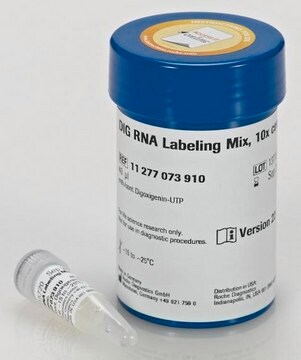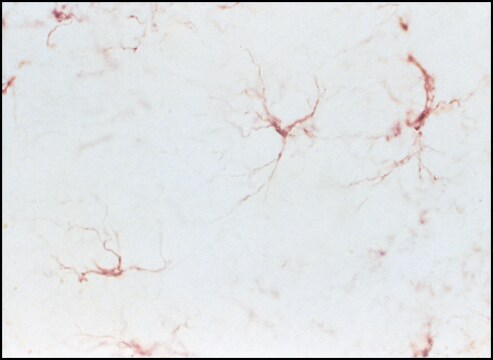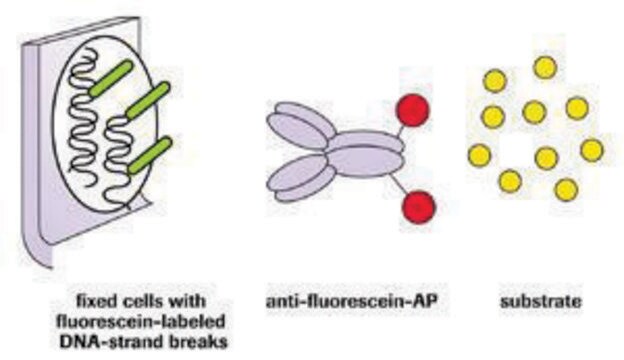11427857910
Roche
Fluorescein-12-UTP
≥85% (HPLC), solution
Synonym(s):
Fluorescein-12-UTP tetralithium salt, Fluorescein-5(6)-carboxamidocaproyl-(5-[3-aminoallyl]uridine 5′-triphosphate)
Sign Into View Organizational & Contract Pricing
All Photos(2)
About This Item
Empirical Formula (Hill Notation):
C39H41N4O22P3
CAS Number:
Molecular Weight:
1010.68
MDL number:
UNSPSC Code:
41116100
Recommended Products
Quality Level
assay
≥85% (HPLC)
form
solution
mol wt
1034.4
packaging
pkg of 25 μL (250 nmol; 10 mM)
manufacturer/tradename
Roche
storage temp.
−20°C
Looking for similar products? Visit Product Comparison Guide
General description
Quality
Typical analysis: At least 85% Fluorescein-12-UTP (HPLC, area%).
Typical analysis: At least 85% Fluorescein-12-UTP (HPLC, area%).
Fluorescein is bound to uridine triphosphate via an amide linkage. Molecular formula is C39H37N4O22P3Li4.
Application
Fluorescein-12-UTP is used as a substrate for SP6, T3, and T7 RNA polymerases. It can replace UTP in the in vitro transcription reaction for RNA labeling.
Labeled RNA can be subsequently detected by in situ hybridization and direct fluorescence detection or detection by ELISA using Anti-Fluorescein-AP, Fab fragments or Anti-Fluorescein-POD, Fab fragments.
Labeled RNA can be subsequently detected by in situ hybridization and direct fluorescence detection or detection by ELISA using Anti-Fluorescein-AP, Fab fragments or Anti-Fluorescein-POD, Fab fragments.
Other Notes
For life science research only. Not for use in diagnostic procedures.
For your convenience, fluorescein-UTP is also available in a convenient labeling mix (single solution with conventional NTPs and Fluorescein-12-UTP).
Storage Class
12 - Non Combustible Liquids
wgk_germany
nwg
flash_point_f
does not flash
flash_point_c
does not flash
Choose from one of the most recent versions:
Already Own This Product?
Find documentation for the products that you have recently purchased in the Document Library.
Customers Also Viewed
Jia-Yu Zhang et al.
Scientific reports, 10(1), 7429-7429 (2020-05-06)
Bioinformatic analysis reveals an enrichment of putative DNA:RNA hybrid G-quadruplex-forming sequences (PHQS) on both sides of the transcription start sites (TSSs) in the genome of warm-blooded animals, suggesting a positive selection of PHQSs in evolution and functional role of DNA:RNA
Gilbert Lauter et al.
Neural development, 6, 10-10 (2011-04-07)
In recent years, mapping of overlapping and abutting regulatory gene expression domains by chromogenic two-color in situ hybridization has helped define molecular subdivisions of the developing vertebrate brain and shed light on its basic organization. Despite the benefits of this
Our team of scientists has experience in all areas of research including Life Science, Material Science, Chemical Synthesis, Chromatography, Analytical and many others.
Contact Technical Service





